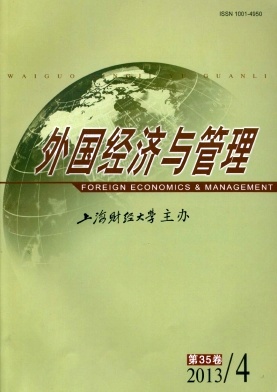社会身份与行为决策关系实验经济学研究前沿探析
外国经济与管理 2013 年 第 35 卷第 04 期, 页码:22 - 31
摘要
参考文献
摘要
本文在系统梳理社会身份与行为决策实验经济学研究文献的基础上,首先分析了社会身份影响行为决策的机理以及两种相关的实验研究方法,然后介绍了囚徒困境博弈、公共品供给博弈、信任博弈、独裁者博弈等实验背景下的社会身份与行为决策关系研究成果,最后在总结和评价现有研究的基础上,针对现有研究所存在的问题提出了若干建议。
[1]Akerlof G and Kranton R.Economics and identity[J].Quar-terly Journal of Economics,2000,115(3):715-773.
[2]Anderson L J,et al.Did the devil make them do itThe effects of religion in public goods and trust games[J].Kyklos,2010,63(2):163-175.
[3]Benjamin D J,et al.Social identity and preferences[J].Ameri-can Economic Review,2010,100(4):1913-1928.
[4]Benjamin D J,et al.Religious identity and economic behavior[R].Working Paper,Cornell University,2011.
[5]Benabou R and Tirole J.Identity,morals and taboos:Beliefs as assets[J].Quarterly Journal of Economics,2011,126(2):805-855.
[6]Bernhard H,et al.Group affiliation and altruistic norm en-forcement[J].American Economic Review,2006,96(2):217-221.
[7]Camerer,C.Behavioral game theory:Experiments in strategic interaction[M].Princeton:Princeton University Press,2003.
[8]Charness G,et al.Individual behavior and group membership[J].American Economic Review,2007,97(4):1340-1352.
[9]Chen R and Chen Y.The potential of social identity for equi-librium selection[J].American Economic Review,2011,101(6):2562-2589.
[10]Chen Y and Li S-X.Group identity and social preference[J].American Economic Review,2009,99(1):431-457.
[11]Eckel C and Grossman P.Managing diversity by creating team identity[J].Journal of Economic Behavior and Organiza-tion,2005,58(3):371-392.
[12]Falk A and Zehnder C.Discrimination and in-group favori-tism in a citywide trust experiment[R].Working Paper,IZA and University of Bonn,2007.
[13]Fehr E and Schmidt K.A theory of fairness,competition and cooperation[J].Quarterly Journal of Economics,1999,114(3):817-868.
[14]Fehr E and Gchter S.Cooperation and punishment in public goods experiments[J].American Economic Review,2000,90(4):980-994.
[15]Fehr E and Hoff K.Tastes,casters,and culture:The influ-ence of society on preferences[J].Economic Journal,2011,121(11):396-412.
[16]Fischbacher U and Gchter S.Social preferences,beliefs,and the dynamics of free riding in public good experiments[J].A-merican Economic Review,2010,100(1):541-556.
[17]Goette L,et al.The impact of group membership on coopera-tion and norm enforcement:Evidence using random assign-ment to real social groups[J].American Economic Review,2006,96(2):212-216.
[18]Goette L,et al.Group membership,competition,altruistic versus anti-social punishment:Evidence from randomly as-signed army group[R].Working Paper,Columbia university,2010b.
[19]Goette L,et al.The impact of social ties on group interac-tions:Evidence from minimal groups and randomly assigned real groups[J].American Economic Journal:Microeconomics,2012,4(1):101-15.
[20]Guala F,et al.Group membership,team preferences,and ex-pectations[J].Journal of Economic Behavior&Organization,2013,86(2):183-190.
[21]Heap H,et al.The value of groups[J].American Economic Review,2009,99(1):295-323.
[22]Hoff K and Pandey P.Discrimination,social identity,and du-rable inequalities[J].American Economic Review,2006,96(2):206-211.
[23]La Porta R,et al.Trust in large organizations[J].American Economic Review,1997,87(2):333-338.
[24]LeBoeuf R A,et al.The conflicting choices of alternating selves[J].Organizational Behavior and Human Decision Processes,2010,111(1):48-61.
[25]Mazar N and Zhong C-B.Do green products make us better people[J].Psychological Science,2010,21(4):494-498.
[26]Sen A.Goals,commitment,and identity[J].Journal of Law,Economics,and Organization,1985,1(2):341-355.
[27]Simpson B.Social identity and cooperation in social dilemmas[J].Rationality and Society,2006,18(4):443-470.
[28]Sutter M.Individual behavior and group membership:Com-ment[J].American.Economic Review,2009,99(5):2247-2257.
[29]Tajfel H,et al.Social categorization and intergroup behavior[J].European Journal of Social Psychology,1971,1(3):149-178.
[30]Tan J H W and Bolle F.Team competition and the public goods game[J].Economics Letters,2007,96(1):133-39.
[31]陈叶烽.亲社会性行为及其社会偏好的分解[J].经济研究,2009,(12):131-152.
[32]王爱君.身份经济学研究述评[J].经济学动态,2011,(10):120-125.
[33]王海珍,刘新梅,张永胜.派系形成对员工满意度的影响及机理:社会网络视角的研究[J].管理评论,2011,(12):116-123.
[34]汪良军.企业强文化的资本性研究[J].中国工业经济,2009,(7):109-119.
[35]谢小云,李倩.国外团队断裂带研究现状评价与未来展望[J].外国经济与管理,2011,(1):29-38.
[2]Anderson L J,et al.Did the devil make them do itThe effects of religion in public goods and trust games[J].Kyklos,2010,63(2):163-175.
[3]Benjamin D J,et al.Social identity and preferences[J].Ameri-can Economic Review,2010,100(4):1913-1928.
[4]Benjamin D J,et al.Religious identity and economic behavior[R].Working Paper,Cornell University,2011.
[5]Benabou R and Tirole J.Identity,morals and taboos:Beliefs as assets[J].Quarterly Journal of Economics,2011,126(2):805-855.
[6]Bernhard H,et al.Group affiliation and altruistic norm en-forcement[J].American Economic Review,2006,96(2):217-221.
[7]Camerer,C.Behavioral game theory:Experiments in strategic interaction[M].Princeton:Princeton University Press,2003.
[8]Charness G,et al.Individual behavior and group membership[J].American Economic Review,2007,97(4):1340-1352.
[9]Chen R and Chen Y.The potential of social identity for equi-librium selection[J].American Economic Review,2011,101(6):2562-2589.
[10]Chen Y and Li S-X.Group identity and social preference[J].American Economic Review,2009,99(1):431-457.
[11]Eckel C and Grossman P.Managing diversity by creating team identity[J].Journal of Economic Behavior and Organiza-tion,2005,58(3):371-392.
[12]Falk A and Zehnder C.Discrimination and in-group favori-tism in a citywide trust experiment[R].Working Paper,IZA and University of Bonn,2007.
[13]Fehr E and Schmidt K.A theory of fairness,competition and cooperation[J].Quarterly Journal of Economics,1999,114(3):817-868.
[14]Fehr E and Gchter S.Cooperation and punishment in public goods experiments[J].American Economic Review,2000,90(4):980-994.
[15]Fehr E and Hoff K.Tastes,casters,and culture:The influ-ence of society on preferences[J].Economic Journal,2011,121(11):396-412.
[16]Fischbacher U and Gchter S.Social preferences,beliefs,and the dynamics of free riding in public good experiments[J].A-merican Economic Review,2010,100(1):541-556.
[17]Goette L,et al.The impact of group membership on coopera-tion and norm enforcement:Evidence using random assign-ment to real social groups[J].American Economic Review,2006,96(2):212-216.
[18]Goette L,et al.Group membership,competition,altruistic versus anti-social punishment:Evidence from randomly as-signed army group[R].Working Paper,Columbia university,2010b.
[19]Goette L,et al.The impact of social ties on group interac-tions:Evidence from minimal groups and randomly assigned real groups[J].American Economic Journal:Microeconomics,2012,4(1):101-15.
[20]Guala F,et al.Group membership,team preferences,and ex-pectations[J].Journal of Economic Behavior&Organization,2013,86(2):183-190.
[21]Heap H,et al.The value of groups[J].American Economic Review,2009,99(1):295-323.
[22]Hoff K and Pandey P.Discrimination,social identity,and du-rable inequalities[J].American Economic Review,2006,96(2):206-211.
[23]La Porta R,et al.Trust in large organizations[J].American Economic Review,1997,87(2):333-338.
[24]LeBoeuf R A,et al.The conflicting choices of alternating selves[J].Organizational Behavior and Human Decision Processes,2010,111(1):48-61.
[25]Mazar N and Zhong C-B.Do green products make us better people[J].Psychological Science,2010,21(4):494-498.
[26]Sen A.Goals,commitment,and identity[J].Journal of Law,Economics,and Organization,1985,1(2):341-355.
[27]Simpson B.Social identity and cooperation in social dilemmas[J].Rationality and Society,2006,18(4):443-470.
[28]Sutter M.Individual behavior and group membership:Com-ment[J].American.Economic Review,2009,99(5):2247-2257.
[29]Tajfel H,et al.Social categorization and intergroup behavior[J].European Journal of Social Psychology,1971,1(3):149-178.
[30]Tan J H W and Bolle F.Team competition and the public goods game[J].Economics Letters,2007,96(1):133-39.
[31]陈叶烽.亲社会性行为及其社会偏好的分解[J].经济研究,2009,(12):131-152.
[32]王爱君.身份经济学研究述评[J].经济学动态,2011,(10):120-125.
[33]王海珍,刘新梅,张永胜.派系形成对员工满意度的影响及机理:社会网络视角的研究[J].管理评论,2011,(12):116-123.
[34]汪良军.企业强文化的资本性研究[J].中国工业经济,2009,(7):109-119.
[35]谢小云,李倩.国外团队断裂带研究现状评价与未来展望[J].外国经济与管理,2011,(1):29-38.
引用本文
汪良军, 刘美辰. 社会身份与行为决策关系实验经济学研究前沿探析[J]. 外国经济与管理, 2013, 35(4): 22–31.
导出参考文献,格式为:





 7402
7402  254
254

